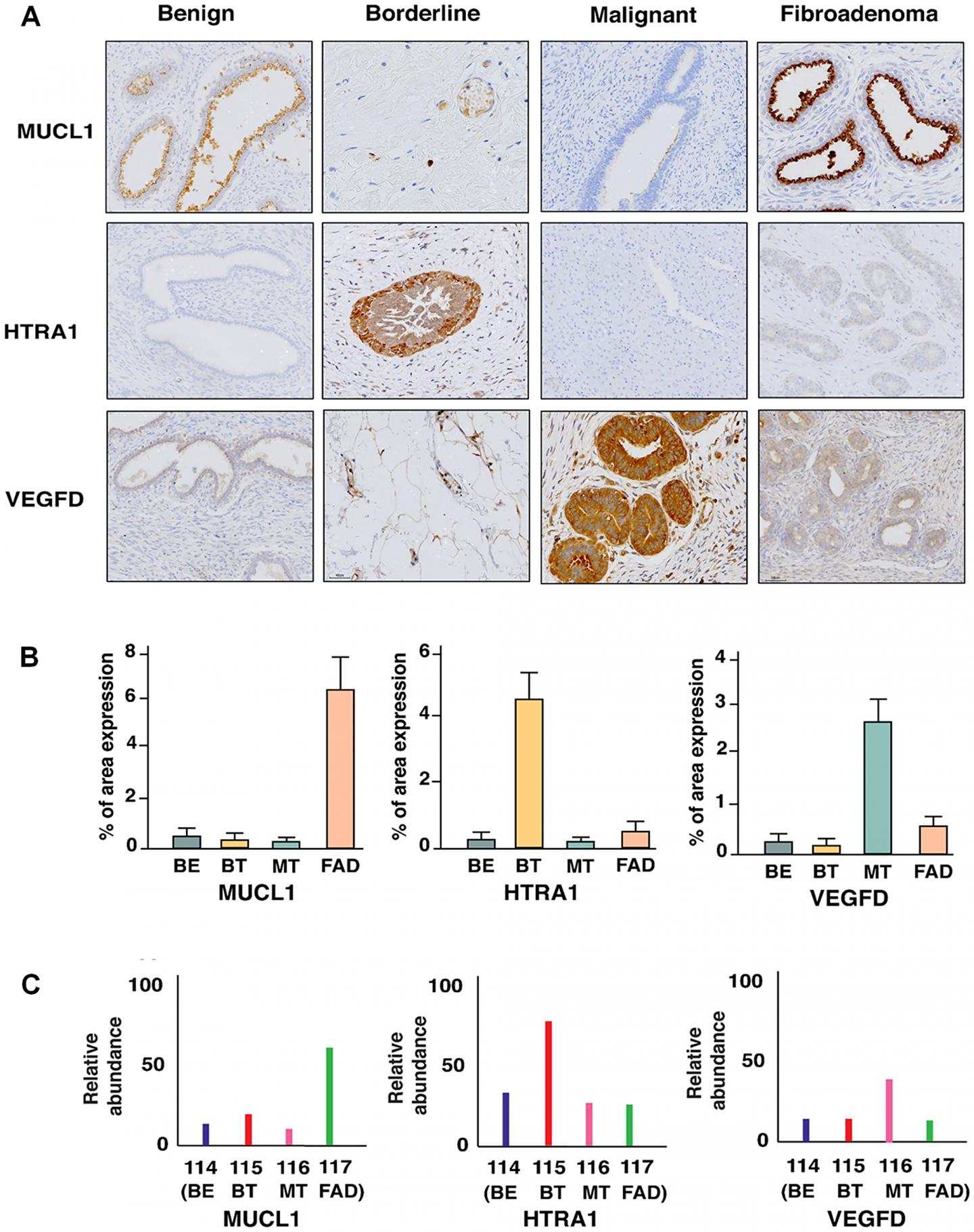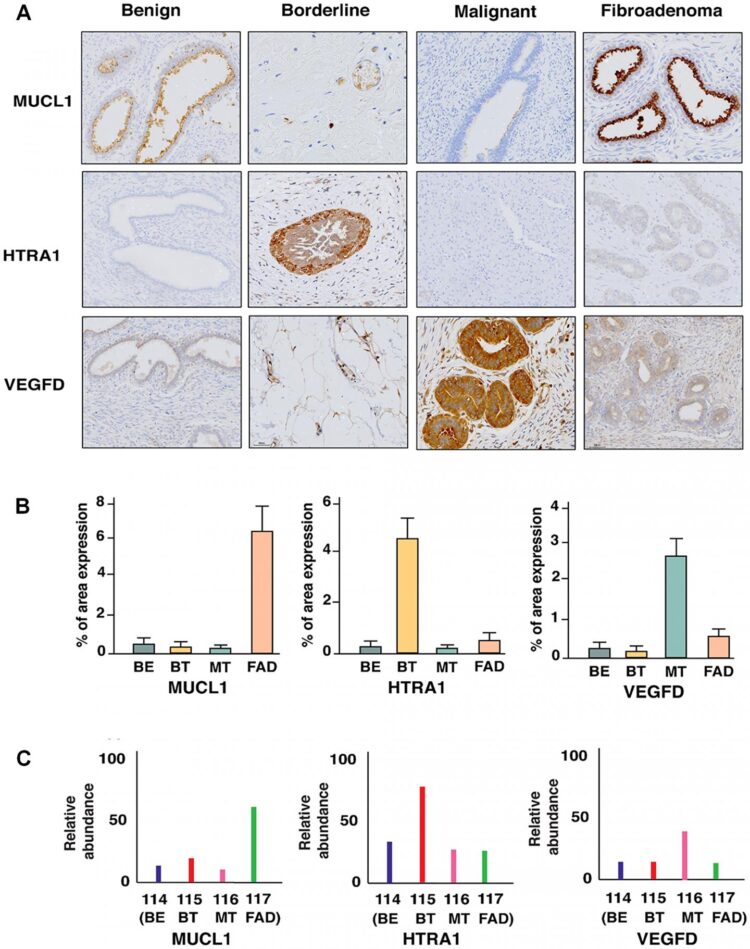The present Oncotarget work shed light on a brief mechanistic framework of PTs aggressive nature and present potential biomarkers to differentiate overlapping FELs that would be of practical utility in augmenting existing diagnosis and disease management

Credit: Correspondence to – Lekha Dinesh Kumar – [email protected] and Prashant Kumar – [email protected]
Oncotarget published “Quantitative proteome profiling stratifies fibroepithelial lesions of the breast” which reported that the current grading system remains unreliable in differentiating these tumors due to histological heterogeneity and lack of appropriate markers to monitor the sudden and unpredictable malignant transformation of PTs.
The high- throughput quantitative proteomic analysis suggested that FAD and PTs form distinct clusters away from borderline and malignant though there exist marked differences between them.
Interestingly, over-expression of extracellular matrices related proteins and epithelial-mesenchymal transition markers in borderline PTs led these authors to hypothesize a model of deposition and degradation leading to ECM remodeling and EMT acquisition triggering its malignant transformation.
They also identified three candidate biomarkers such as MUCL1, HTRA1, and VEGDF uniquely expressed in FAD, borderline, and malignant PTs, respectively, which were further validated using immunohistochemistry.
The present Oncotarget work shed light on a brief mechanistic framework of PTs aggressive nature and present potential biomarkers to differentiate overlapping FELs that would be of practical utility in augmenting existing diagnosis and disease management for this rare tumor.
The present Oncotarget work shed light on a brief mechanistic framework of PTs aggressive nature and present potential biomarkers to differentiate overlapping FELs that would be of practical utility in augmenting existing diagnosis and disease management for this rare tumor
Dr. Lekha Dinesh Kumar and Dr. Prashant Kumar both from The CSIR-Centre for Cellular and Molecular Biology said, “Fibroepithelial lesions (FELs) of the breast are a group of biphasic tumors that are highly heterogeneous in terms of their morphological as well as biological features.“
FADs are widespread tumors accounting for 68% of all breast masses and 44–94% of biopsied breast lesions.
A commonly encountered complication in diagnosis is the differentiation of FADs and benign PTs primarily contributed by the overlapping histologic and morphological characteristics between these lesions.
Several recurrently mutated genes unique to FAD and PTs, and several protein markers have also been investigated previously for their diagnostic utility and association with histological grade in FELs.
However, not much effort has been made to identify potential diagnostic biomarkers that could improve the diagnostic practice to classify PTs and differentiate them from FADs.
To this end, the authors employed iTRAQ based quantitative proteomics of FELs to extensively characterize the proteomic alterations across these tumors in order to identify potential biomarkers and distinctly stratify these overlapping tumors.
The Kumar/Kumar Research Team concluded in their Oncotarget Research Output, “this study provided a comprehensive profile of differentially regulated proteins across various subtypes of FELs. The presence of extensive ECM proteins and EMT markers led us to hypothesize a model of deposition and degradation of these proteins thus triggering ECM remodeling and EMT acquisition in borderline PTs leading to its malignant state. Enrichment of platelet degranulation factors in malignant PT indicates active angiogenesis during this transformation. Herein, our initial findings suggest that MUCL1, HTRA1, and VEGFD can be used as potential proteomic markers that could augment existing diagnosis, and help in monitoring the progression of the disease. Further characterization of FELs using different omics platforms would help in better understanding of the cellular and molecular events that would help in understanding the disease dynamics and thus better management of the disease.“
###
Sign up for free Altmetric alerts about this article
DOI – https:/
Full text – https:/
Correspondence to – Lekha Dinesh Kumar – [email protected] and Prashant Kumar – [email protected]
Keywords –
breast tumors,
fibroepithelial lesions,
phyllodes,
iTRAQ,
quantitative proteomics
About Oncotarget
Oncotarget is a bi-weekly, peer-reviewed, open access biomedical journal covering research on all aspects of oncology.
To learn more about Oncotarget, please visit https:/
SoundCloud – https:/
Facebook – https:/
Twitter – https:/
LinkedIn – https:/
Pinterest – https:/
Reddit – https:/
Oncotarget is published by Impact Journals, LLC please visit https:/
Media Contact
[email protected]
18009220957×105
Media Contact
Ryan James Jessup
[email protected]
Original Source
https:/
Related Journal Article
http://dx.





